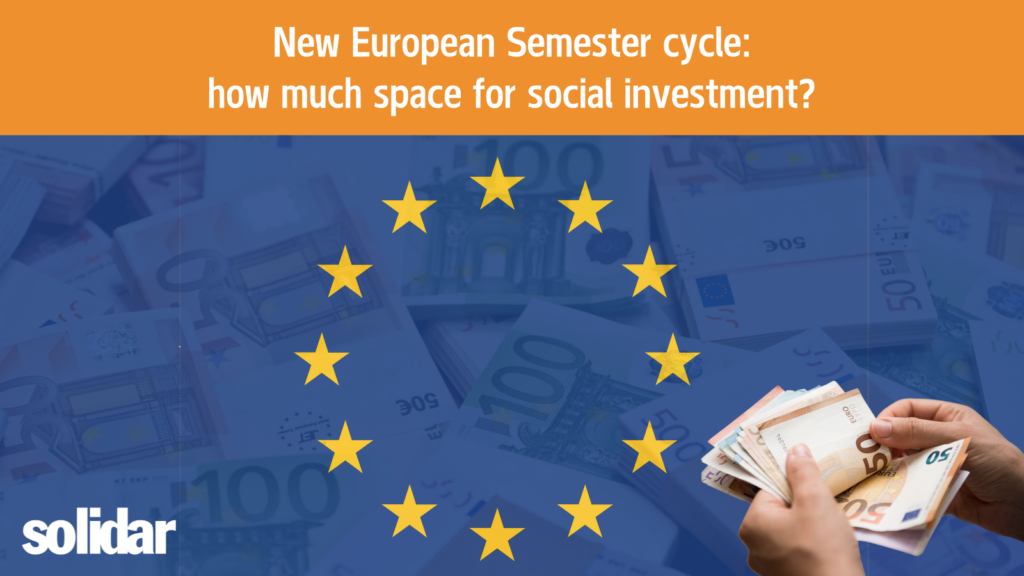New European Semester cycle: how much space for social investment?

The 2025 European Semester cycle has officially kicked off with the release of the Autumn Package at the close of 2024, marking the first under the new austerity-driven economic governance framework. The Semester aims to achieve macroeconomic stability, growth and fiscal sustainability, while at the same time encouraging investment. But here’s the pressing question that many will ask upon reading this for the first time: How can this be accomplished, especially given the massive public investments required to promote social justice while protecting people and the planet from climate change?
We sought answers in the Commission’s documents but found none. Instead, we are left with a discouraging conclusion: the Commission is claiming to put investment and reform on the same level as growth and macroeconomic sustainability, but the last two are the only things that really matter (does the Draghi report ring a bell?) if forced to choose. And they will have to choose because this is what the fiscal rules mandate the member states to do. To be more specific:
- In the proposed recommendation on the economic policy of the euro area for 2025 the Commission clearly states that the EU has shown resilience during recent crises, including Covid-19, and also acknowledges that this resilience was largely due to the intervention of the EU, for instance through the activation of the general escape clause of the Stability and Growth Pact. Sadly, it does not draw the logical conclusion that this flexibility is clearly what is needed to face other epochal challenges, like the green and digital transition, nor that the return to rigid fiscal rules marked by the new economic governance will undermine this process. The necessary fiscal space to promote social justice, environmental and climate targets beyond a competitiveness-led logic must be ensured.
- The fact that an increased employment rate does not correspond to an increase in quality jobs and that wages are not adequate across the EU is mentioned. However, no clear call to the Member States to ambitiously implement the Adequate Minimum Wages Directive is made. More should be done to remind Member States of their obligations, also considering the underwhelming transposition process of the Directive. Or are social rights less relevant than an excessive deficit?
- The socially just transition approach should be mainstreamed across the European Semester to ensure that country-specific reform and investment recommendations equally support economic, environmental, and social dimensions. For real.
- It is positive that a shift from labour taxation to other forms of taxation is recommended by the Commission. However, the solution should go beyond the property taxation suggested by the Commission and include a broader overhaul of the tax base, including increased wealth taxation.
- Even if we appreciate the inclusion of employers’ and trade unions’ views in the Autumn Package, social dialogue should be further strengthened across the board. Generally, there should be a greater emphasis on participation through a broadened approach as well. We call for a more meaningful involvement of democratic and representative civil society in the European Semester.
Concerning the documents focused on macroeconomic stability, it is positive that a certain level of flexibility and ownership is granted to Member States and that public investment is encouraged, but there are many elements that remain problematic and strongly limit the potential benefits of the reviewed economic governance. Among these is the lack of prioritisation of social objectives. These are instead put on the same level as defence objectives, potentially leading to increased securitisation at the expense of social and green investments. As mentioned, the arbitrary fiscal rules contained in the Stability and Growth Pact have been fully reintegrated, which results in a schizophrenic approach: encouraging public investments while imposing strict fiscal rules. Finally, the maintained focus on growth leads the Commission to lose sight of what should be the main priority: pursuing the well-being of all people while respecting planetary boundaries.
An overview of the documents contained in the Package below can help locate the elements flagged so far.
Next steps
The Autumn Package will be discussed by the Council and the Commission will also engage in dialogue with the European Parliament and the relevant stakeholders. We urge the European Commission to take into account the above-mentioned observations in the next phases of the Semester to finally transform it into a tool for upward social convergence and to ensure a participatory and democratic process, by meaningfully involving civil society organisations.


